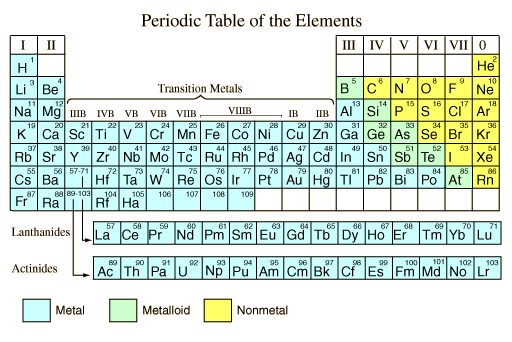| Topic: "Diamonds, the hardest metal." | |
|---|---|
|
"Diamonds are so hard, they are the hardest metal in the world." Thoughts on this statement?
|
|
|
|
|
|
"Diamonds are so hard, they are the hardest metal in the world." Thoughts on this statement? wrong,Diamonds are Carbon,not a Metal! you're right about the Degree of Hardness though! http://en.wikipedia.org/wiki/Diamond |
|
|
|
|
|
Diamonds hmmm.....women love em....people kill over them....africa has loads of them....i've dealt with them on the side....diamonds are so rare....its like finding that ideal unique woman thats distinct from any other
|
|
|
|
|
|
Carbon is not a metal. see below.

|
|
|
|
|
|
Carbon is not a metal.
Nice to see the Mendeleev's olde musical chart brought up. Now Sir, how does this explain why diamonds are so hard? "Diamonds are so hard, they are the hardest metal in the world." The high school story on where diamonds came from: from the period when earth was condensing, gases trapped, CO2 among them; condensing pressure so high that it cannot be replicated by technology. Condensing pressure so high that oxygen broke free from carbon and C had to take the pressure brunt. C zipped down to a compact structure, so absolutely compact that even light falling on it reflected back in full!! So compact that no metallic crystal can match it; silver, gold, stainless steel, all are nothing to this avatar of the humble carbon. Which raises the following questions? How are diamonds located apart from those found scattered in South Africa and Zimbabwe. (assuming subterranean rivers washed them up). Just tunnel down 1 km as in this link to a Siberia mine: https://www.youtube.com/watch?v=8uLuecS_PTk 500 guys, working through 25 miles of tunnels & now going below the 1km mark. Which brings to light what CERN is really about. With all those high velocity neutrons zipping around it's jus a matter of time before the nearly bankrupt French government pushes the scientists to intro some CO2 in the tunnel and bang; diamond dust results. |
|
|
|
|
|
Carbon is not a metal.
Nice to see the Mendeleev's olde musical chart brought up. Now Sir, how does this explain why diamonds are so hard? "Diamonds are so hard, they are the hardest metal in the world." The high school story on where diamonds came from: from the period when earth was condensing, gases trapped, CO2 among them; condensing pressure so high that it cannot be replicated by technology. Condensing pressure so high that oxygen broke free from carbon and C had to take the pressure brunt. C zipped down to a compact structure, so absolutely compact that even light falling on it reflected back in full!! So compact that no metallic crystal can match it; silver, gold, stainless steel, all are nothing to this avatar of the humble carbon. Which raises the following questions? How are diamonds located apart from those found scattered in South Africa and Zimbabwe. (assuming subterranean rivers washed them up). Just tunnel down 1 km as in this link to a Siberia mine: https://www.youtube.com/watch?v=8uLuecS_PTk 500 guys, working through 25 miles of tunnels & now going below the 1km mark. Which brings to light what CERN is really about. With all those high velocity neutrons zipping around it's jus a matter of time before the nearly bankrupt French government pushes the scientists to intro some CO2 in the tunnel and bang; diamond dust results. they make diamonds all the time... matter of fact, only a certain test can tell the difference, jewelers can't... https://en.wikipedia.org/wiki/Synthetic_diamond |
|
|
|
|
|
Thanks MM.
Used to wonder where the diamond cutting wheels came from, synthetic of course. But the sizes are miniscule, powdery. As per Wiki, appears 10 carats is largest 'lab grown' = 2 gms? Anyway, the topic 'diamonds' makes one speculate how C is probably an element unmatched for it's diverse range of avatars. |
|
|
|
|
|
Edited by
mightymoe
on
Tue 08/11/15 11:56 AM
|
|
|
Thanks MM. Used to wonder where the diamond cutting wheels came from, synthetic of course. But the sizes are miniscule, powdery. As per Wiki, appears 10 carats is largest 'lab grown' = 2 gms? Anyway, the topic 'diamonds' makes one speculate how C is probably an element unmatched for it's diverse range of avatars. yea, i watched a show on them the other day, called "how it's made" on the science channel... it takes months and lots of expensive equipment to make them... |
|
|
|
|
|
The geology of making diamonds is really interesting. Carbon, like many other elements, tends to aggregate to form crystals deep in the Earth's mantle. Billions of tons of huge diamonds exist just below the Earth's crust. Volcano's can bring them up if the conditions are right and keep them from burning up from the heat and the oxygen from the atmosphere.
Recently, a man learned the electronic "signature" of the mineral fields where diamonds are found and flew across Canada to mark the hidden diamond fields. He then went on a journey to get investors to pay for development of the diamond mines. He got enough money together to go collect some diamonds, file some claims and prove his methods. He then sold the whole shebang to DeBeers for an unknown amount thought to be in the billions. All the small investors who gave him money are now rich. Diamonds are hardest substance because the four electrons form the four sides of a tetrahedron, the most compact and efficient geometric shape. |
|
|
|
|
|
Thanks MM. Used to wonder where the diamond cutting wheels came from, synthetic of course. But the sizes are miniscule, powdery. As per Wiki, appears 10 carats is largest 'lab grown' = 2 gms? Anyway, the topic 'diamonds' makes one speculate how C is probably an element unmatched for it's diverse range of avatars. yea, i watched a show on them the other day, called "how it's made" on the science channel... it takes months and lots of expensive equipment to make them... Psh. Superman can do it in seconds with his bare hands. |
|
|
|
|
|
Edited by
JaiGi
on
Wed 08/12/15 12:46 PM
|
|
|
Diamonds are hardest substance because the four electrons form the four sides of a tetrahedron, the most compact and efficient geometric shape. Tetrahedron, ok, makes good sense as a 'rigid' geometric shape for any kind of structure. 
Just a minute, i was told that crystals were formed when "atoms regrouped" to geometric shapes like Body centered Cubic or Face Centered Cubic; stuff we learnt from about steel changing it's metallurgical structure at 960C or so. (Red hot, yielding because of micro-change but not white, molten). Now you are stating that crystalline structures are based at a root level, like carbon's valence electrons re-grouping to form this rigid protective canopy around it's nucleus. That's at the sub-atomic level!! Ok, maybe it's the basic prismatic structure that builds up to what is the octahedral class of structures. 
Slightly off topic: 
Kohinoor was not presented, ripped off among other things by the Brits. Recently, a man learned the electronic "signature" of the mineral fields where diamonds are found.. Seems there's a linkage from graphite to diamonds. Graphite as we know, is highly 'electronic' and diamond quite the opposite. Smoke above the fire? The real question though is apart from the jewel value & as a cutting tool bit, are there any serious applications? |
|
|
|
|
|
Diamonds are hardest substance because the four electrons form the four sides of a tetrahedron, the most compact and efficient geometric shape. Tetrahedron, ok, makes good sense as a 'rigid' geometric shape for any kind of structure. 
Just a minute, i was told that crystals were formed when "atoms regrouped" to geometric shapes like Body centered Cubic or Face Centered Cubic; stuff we learnt from about steel changing it's metallurgical structure at 960C or so. (Red hot, yielding because of micro-change but not white, molten). Now you are stating that crystalline structures are based at a root level, like carbon's valence electrons re-grouping to form this rigid protective canopy around it's nucleus. That's at the sub-atomic level!! Ok, maybe it's the basic prismatic structure that builds up to what is the octahedral class of structures. 
Slightly off topic: 
Kohinoor was not presented, ripped off among other things by the Brits. Recently, a man learned the electronic "signature" of the mineral fields where diamonds are found.. Seems there's a linkage from graphite to diamonds. Graphite as we know, is highly 'electronic' and diamond quite the opposite. Smoke above the fire? The real question though is apart from the jewel value & as a cutting tool bit, are there any serious applications? use in Laser-windows,and as windows in Cyclotrons etc. (Permeable to UV-Radiation) http://www.abazias.com/diamondblog/diamond-news/scientific-and-medical-applications-of-diamonds |
|
|
|
|
|
use in Laser-windows,and as windows in Cyclotrons etc. (Permeable to UV-Radiation) http://www.abazias.com/diamondblog/diamond-news/scientific-and-medical-applications-of-diamonds[//quote] Great read, about how the structure helps in examining materials at "molecular levels"!!! 
Thanks Conrad. Granny's diamonds just got pricier now. 
|
|
|
|
|
|
Edited by
Pansytilly
on
Wed 08/12/15 06:52 PM
|
|
|
http://www.sciencedirect.com/science/article/pii/S1369702111700876 - medical applications of diamond particle and surfaces
http://www.e6.com/wps/wcm/connect/e6_content_en/home/applications - applications of synthetic diamonds |
|
|
|
|
|
Hi Pansy,
Lovely links, utterly lovely. Nice if you could throw in your evaluation on the medical side; since you already are in health care. Let's know if it's still in lab stage, for some strange reason 'fools gold' comes to my mind; or has it come out into practice. Anyway, revisited this old visual treat: http://www.dailymotion.com/video/x2dovek_james-bond-diamonds-are-forever_tv wonder where they get those Bond girls from. 
|
|
|
|
|
|
If you build them diamonds...
They will come. 
|
|
|
|
|
|
I think Shirley says it all. http://www.dailymotion.com/video/xlgt7s_shirley-bassey-diamonds-are-forever-from-divas-are-forever-dvd_music |
|
|
|
|
|
Diamonds aren't metal, does that mean air isn't a solid?
|
|
|
|
|
|
Edited by
mightymoe
on
Thu 08/13/15 09:52 PM
|
|
|
Diamonds aren't metal, does that mean air isn't a solid? i feel anything can be a solid, if the atoms are close enough together.... by pressure or otherwise... i mean, diamonds are mostly carbon dioxide, an abundant gas like oxygen.... |
|
|
|
|
|
Diamonds aren't metal, does that mean air isn't a solid?
this reminds me of the missionary who traveled deep into Africa and whot not. after toiling with the natives and earning their trust, he began teaching them about the 'higher life'. His passionate recitals from the Bible enthralled the villagers who gathered each evening for more; even made the old witch doctor recede to backdrop. Then it was time to move on to the next village and so on the last day at the end of the sermon as he finally closed the holy book, he asked them if they had any doubts and to clear it with him now. There was silence then one black face lit up with an ivory smile, raised his hand; as was the new practices. "Yes, brother Leeu Jagter Bin Laden Bin Laden", Preacher quite pleased that he could recall their names; this one meant: Grandson of Lion Hunter; "speak openly and come out with your doubts." All eyes were on the young man as he arose from the crowd; this was their fearless warrior and he asked: Bwana, great medicine man, our spirits rise up each evening when we gather here to listen you read the Holy Book but tell us before you go: who is this Jesus? |
|
|
|
|












